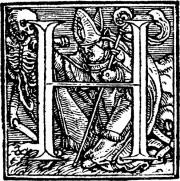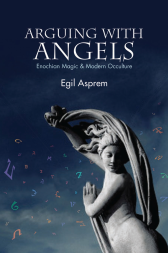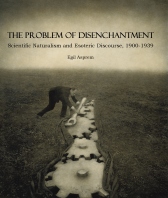 Utrecht has apparently become the place for me to see visiting historians of science. A couple months back Peter Galison gave lectures and a workshop on secrecy and science, and now last week, the alchemy specialist Lawrence Principe gave the third Descartes-Huygens lecture on “Uncovering the Secrets of Alchemy and its Role in the History of Science”. It was quite a ceremonial occasion, as Principe, who is ordinarily based at John Hopkins University, was officially given an honorary fellowship at Utrecht Unversity. As the man himself opened by saying, this was probably the first time since the 17th century that the oration of a new fellow would be devoted to the art of alchemy.
Utrecht has apparently become the place for me to see visiting historians of science. A couple months back Peter Galison gave lectures and a workshop on secrecy and science, and now last week, the alchemy specialist Lawrence Principe gave the third Descartes-Huygens lecture on “Uncovering the Secrets of Alchemy and its Role in the History of Science”. It was quite a ceremonial occasion, as Principe, who is ordinarily based at John Hopkins University, was officially given an honorary fellowship at Utrecht Unversity. As the man himself opened by saying, this was probably the first time since the 17th century that the oration of a new fellow would be devoted to the art of alchemy.
The lecture itself did not contain much new to those who are half-way familiar with the place of alchemy in recent history of science. (For a glimpse into some of the nuances of those debates, one can do much worse than looking at the two recent posts over at Ether Wave – they deal with Principe’s close colleague, William Newman). Instead, it offered a good introduction to the project that Principe has devoted most of his career to, namely what he constantly refers to as the “rehabilitation of alchemy”.
What does that mean? In a nutshell, Principe is fighting a wide-spread and surprisingly persistent image of early modern alchemy as something totally different from “proper” chemistry – a misguided pursuit generally, an obscurantist quest for impossible truths typically, or maybe even something completely allegorical, like the vision of a purely “spiritual alchemy”. The latter was invented by 19th century occultists, and later “psychologized” by C. G. Jung and his followers, from where it has remarkably gained something of an upper ground on the interpretation of alchemy for a surprisingly long time. Against these various perceptions of alchemy, Principe (and his colleague Newman) argue that alchemy was a “proper science”.
In this project the Jungian interpretation becomes a natural enemy. Shortly put, the Jungian approach is to look at the seemingly incomprehensible symbolism which shows up in alchemical treatises as allegorical of higher things – psychological processes or religious aspirations. Thus lions devouring suns and the copulation of kings and queens primarily signify “archetypical” manifestations.
No, says Principe: the intricate symbolism is about something very concrete, and it is possible to find out exactly what. They are actually veiled ways of talking about concrete laboratory practices and experimental procedures. As a double PhD in chemistry and the history of science, Principe’s project has been to take the alchemists seriously: find out what they were talking about, and carry out the experiments. Based on the results he has gathered from his own alchemical laboratory, Principe suggests that alchemical talk of trees that will grow the philosopher’s stone, or the grey wolf that springs forth are indeed quite literal attempts to describe how certain chemical reactions look like. Without the technical and analytical language of later chemistry, experimental results necessarily had to be framed within the analogical mode of description and classification which so characterized much of renaissance and early modern forms of knowledge.
 So why all this obscurity? First of all, Principe stresses that the alchemists were not always veiling their procedures. In fact, when looking at surviving correspondences between alchemists, and private diaries and laboratory logs that were kept, the symbolism becomes stripped down to the basics. Instead we get attempts to describe as clearly as possible what kinds of chemicals are being used, in which proportions, how they are heated, for how long, etc. This feature is evident in the American alchemist George Starkey, for example, who was Robert Boyle’s teacher and kept a scientific correspondence with him where experiments were put in more or less plain text (check out Principe and Newman’s Alchemy Tried in the Fire for the details).
So why all this obscurity? First of all, Principe stresses that the alchemists were not always veiling their procedures. In fact, when looking at surviving correspondences between alchemists, and private diaries and laboratory logs that were kept, the symbolism becomes stripped down to the basics. Instead we get attempts to describe as clearly as possible what kinds of chemicals are being used, in which proportions, how they are heated, for how long, etc. This feature is evident in the American alchemist George Starkey, for example, who was Robert Boyle’s teacher and kept a scientific correspondence with him where experiments were put in more or less plain text (check out Principe and Newman’s Alchemy Tried in the Fire for the details).
In other words there seems to be a divide between the public and private discourse of the alchemists. For all sorts of concerns, from hiding recipes to avoiding persecution, the adoption of an elaborate and mystifying symbolical form of expression provided the alchemist with a way to strike a balance between concealing and revealing his secrets. In private, and between trusted colleagues, such secrecy and concealment was not needed, and could be dropped for the sake of effective communication between peers. Hence, to understand what is being concealed, how the symbolism is built up, and how it refers to laboratory practices, one has to go from the detailed notes made in private to the symbolical representations put before the public.
The possible historiographical danger of the “rehabilitation program” is that one downplays the various other connotations the practice of early modern natural philosophy could have, besides those which are directly translatable into something like current scientific language. While the work done by Principe and Newman seems highly valuable for making sense of the experimental context, and the “rationality” of alchemy so to speak, there seem also to be obvious religious connotations to much alchemical work. When one takes fully into account the focus on reading the book of nature, of signatures, correspondences, analogies, the place of nature within salvation history, and other such themes which permeated early modern natural philosophy, the attempt at a direct “translation” of alchemy into the language of modern chemistry seems a bit simplistic. Something significant for its understanding will be lost in the process.
Luckily, Principe will be coming to Amsterdam in a few weeks to join our workshop on “Alchemy: between Religion and Science”, where precisely these kinds of questions will come to the fore. I will therefore leave the topic for now, and rather blog more about it when I have seen Principe discuss the matter with specialists who may have slightly different perspectives.

This work by Egil Asprem was first published on Heterodoxology. It is licensed under a Creative Commons Attribution-ShareAlike 3.0 Unported License.







Clear and concicse summation of Principe’s talk.
I, too, am looking forward to hearing how he deals with the religious connotations.
[…] particularly focus on Larry Principe’s talk, since this gives me opportunity to follow up on a previous post about his lecture in Utrecht a few weeks ago. Also, for those whose interests are particularly in […]
[…] separate things – from Mesmerism to 19th century scientism to eugenics in Norway to lectures on alchemy to Goetic ritual magic – is keeping a track on what’s being read, and from […]
[…] Heterodoxology: Lawrence Principe and the Rehabilitation of Alchemy (also, info about a thesis workshop on […]
[…] simplistic. Something significant for its understanding will be lost in the process.” from Lawrence Principe and the Rehabilitation of Alchemy by Emil Asprem, an article recommended by […]
[…] will particularly focus on Larry Principe’s talk, since this gives me opportunity to follow up on a previous post about his lecture in Utrecht a few weeks ago. Also, for those whose interests are particularly in […]
[…] take issue not only with the popular framing, but with the overall methodology for which Newman, together with Larry Principe, is famous. Simply put, their way to rehabilitate “alchemy” as a suitable subject for […]
Lawrence Principe gave me gold flakes in the mail.
Did he teach you how to make it as well?
[…] Lawrence Principe and the Rehabilitation of Alchemy – another lecture in Utrecht […]